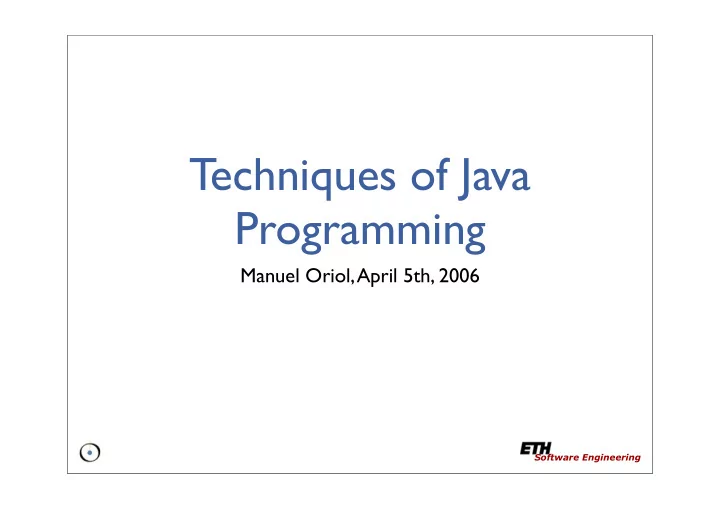

Techniques of Java Programming Manuel Oriol, April 5th, 2006 Software Engineering
Goal • Teach Java to proficient programmers • Teach basics and also advanced features • Have people read research articles and specifications Software Engineering
Roadmap • Java Basics • Eclipse • Threads and synchronization • Class loading and reflection • Java Virtual Machines • Byte-Code and Just-In-Time compilation • Java Middleware • Java Components and more... Software Engineering
Modus Operandi • Assistants: Dr. Lisa Ling, Till G. Bay, Andreas Leitner • Lectures: - 2 hours lectures on Thursday - 1 hour exercise on Wednesday • Exercises will be corrected in the exercise lectures, not graded • Written exam: 60% of the grade • Project: 40% of the grade Software Engineering
Documents • Slides - Web • Course Abstract - Printed... • Articles/Reading material - Web links Software Engineering
Java Basics: Part 1 - Java Tools Manuel Oriol, April 5th, 2006 Software Engineering
Java • O–O language • multi-platform • type-safe • class-based • imperative Software Engineering
The Big Picture Documentation Source Code Documentation Generator .java javadoc .html javac .class java Byte Code, Virtual Compiler Program Machine Software Engineering
Environment Variables • PATH • CLASSPATH Software Engineering
Java Compiler • javac *.java • arguments are files with extension .java • each class has a .class file • options: -g for debugging -verbose -cp for classpath -d for output directory Software Engineering
Java Virtual Machine (JVM) • java MyMain • arguments is a class name containing main method • each class loaded on-demand • options: -verbose -cp for classpath -d for output directory Software Engineering
Java Documentation • javadoc *.java • comments /** */ and // • options: -verbose -cp for classpath -d for output directory Software Engineering
Java Archive • jar cvf classes.jar *.class • first argument is the target is option f • each class loaded on-demand • options: c create the archive v verbose mode f first argument is target file name x extract archive Software Engineering
Java Debugger • jdb MyMain • commands during execution: stop at MyMain:25 stop in MyMain.myMehtod next step run print Software Engineering
Java Basics Part 2 - Language Manuel Oriol, April 5th, 2006 Software Engineering
Hello World! public class HelloWorld { public static void main(String[] args){ System.out.println("Hello World!"); } } Software Engineering
Packages • Package Names: general.lessGeneral.precise • Defines a directory infrastructure • Fully Qualified Name Software Engineering
Primitive Types • Primitive types: int, byte, char, long, short, boolean • comparisons: <,>,==,>=,<=, != • operators: +, -, *, / • Equivalent classes: Integer, Byte, Character, Long, Short, Boolean Software Engineering
Reference Types • Classes • Generic classes • Interfaces Software Engineering
Class • abstract public abstract class MyClass{ • final • public } Software Engineering
Interfaces • Only signature of methods • has to be implemented in classes public interface MyInterface{ ... } Software Engineering
Inheritance • Single inheritance • implementation of interfaces to simulate multiple inheritance public class MyClass extends Object implements MyInterface{ } Software Engineering
Arrays • Type [] • Declared when using variables Software Engineering
Generic Classes • Classes dependent on another class • (Will come back to this) public class MyClass < E >{ } Software Engineering
Variables • Local Variables • Instance Variables • Class Variables Software Engineering
Local Variable • Declared in the code (no matter the location) • Local to the current block ({}) • Must be initialized before using them int a; int b=3; MyClass c; String s=”Hello World!”; Software Engineering
Instance Variables • Declared the same way as local variables but outside any method • final, transient, volatile • Visibility: public int a; private int b=3; • public MyClass c; • protected protected String s=”Hello • default World!”; • private Software Engineering
Class Variables • As instance variables but with static • shared by all instances Software Engineering
this • refers to the current object Software Engineering
Recommend
More recommend